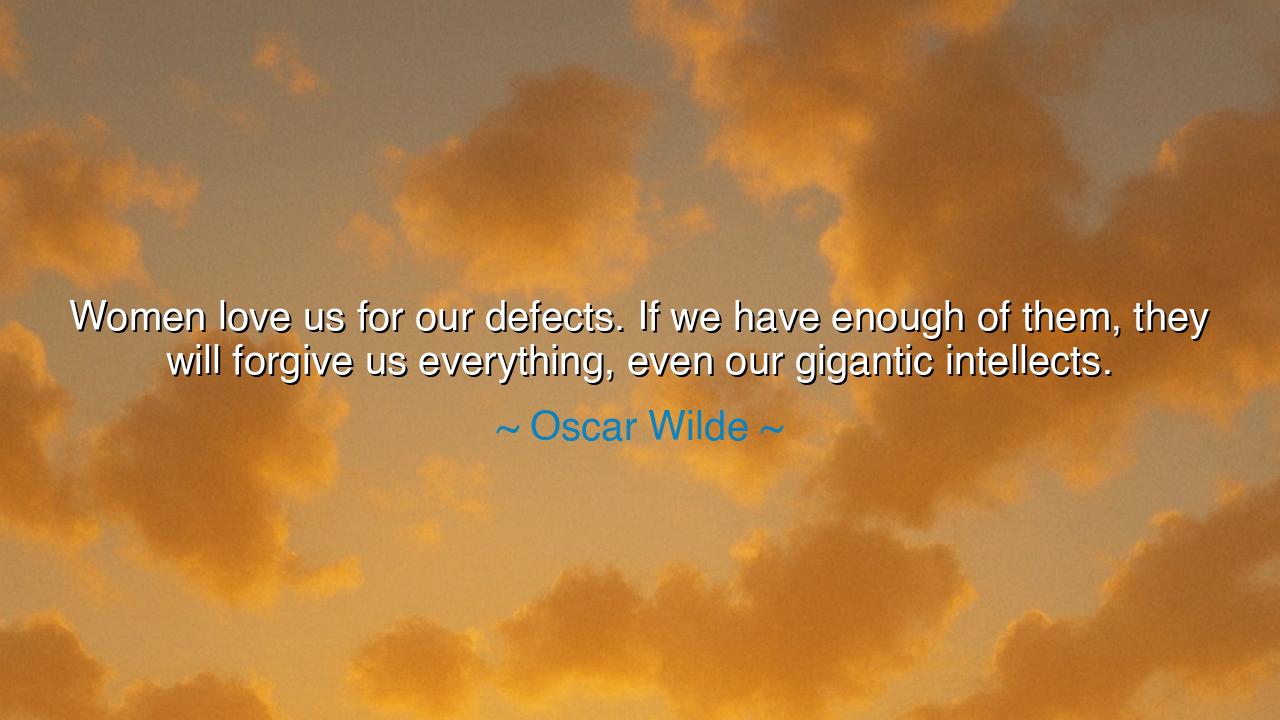
Women love us for our defects. If we have enough of them, they
Women love us for our defects. If we have enough of them, they will forgive us everything, even our gigantic intellects.






The words of Oscar Wilde, “Women love us for our defects. If we have enough of them, they will forgive us everything, even our gigantic intellects,” are a shining example of his genius—a paradox wrapped in humor, concealing beneath its wit a deep understanding of the human heart. Wilde, who was both a poet and a philosopher of love’s ironies, uses laughter to reveal truth: that perfection does not endear, and flawlessness does not inspire affection. What draws love from the heart, he suggests, is not brilliance or grandeur, but vulnerability, the quiet confession that one is human after all.
To understand this quote, one must enter the spirit of Wilde’s age—Victorian England, a time obsessed with decorum, intellect, and status. Men prided themselves on logic, learning, and mastery of reason; women, in the eyes of society, were to admire and submit. But Wilde, with the wisdom of the rebel and the heart of the poet, saw through this pretense. He understood that love is not born of admiration for perfection, but of compassion for imperfection. It is in the cracks of our armor that others find a way to reach our souls. When he writes that women forgive “our gigantic intellects,” he mocks the arrogance of men who think that intelligence alone makes them lovable. Love, he implies, begins where pride ends.
In every great romance, there is this tension between strength and frailty. The lover may dazzle with charm or brilliance, but it is the moment of honesty, of weakness, of revealed imperfection, that truly binds the heart. Consider the story of Elizabeth Barrett and Robert Browning, two poets of the nineteenth century. Robert admired Elizabeth’s genius, but it was not her intellect that captured his soul—it was her frailty, her illness, her quiet courage. And she, in turn, loved not the perfection of his verse, but the warmth of his humanity. Their letters reveal what Wilde knew instinctively: that love grows not in the shadow of greatness, but in the light of shared imperfection.
Wilde’s humor also contains a subtle challenge to men: do not hide behind intellect, for the heart does not worship cleverness. The man who seeks love by being impressive will earn applause, not affection. It is his humility, not his mind, that will invite devotion. Wilde himself, known for his towering intellect and glittering wit, was loved and pitied in equal measure. His life, marked by brilliance and tragedy, reflected the very truth of his words. When the world cast him down, it was not his intellect that saved him, but the compassion of those who saw the wounded humanity beneath his art. His friends, his admirers, and even his former lovers forgave much—not because he was perfect, but because he was flawed and therefore real.
The ancients, too, recognized this paradox. The philosopher Plato, in his Symposium, described love as the search for one’s missing half—not the perfect mirror of oneself, but the completion of one’s incompleteness. Wilde’s wit transforms this into modern form: women love men not because they are whole, but because they are beautifully incomplete. Their “defects,” as he calls them, awaken the nurturing, forgiving, and empathetic nature of love. For what the heart desires is not a statue to worship, but a soul to heal, to understand, to walk beside in shared imperfection.
There is also in Wilde’s words a deeper reflection on forgiveness, the most divine quality of love. To love someone’s flaws is not to be blind, but to see clearly and still choose tenderness. It is easy to adore what is beautiful; it is holy to love what is broken. The woman who forgives the man’s weaknesses, who sees his heart beneath his pride, embodies the sacred strength of compassion. Wilde’s jest, then, is no mere joke—it is a hymn to mercy. For in the eyes of true love, defects are not sins but signatures, the marks that make each soul unique.
So let this teaching be passed down: love does not seek perfection, it seeks presence. Do not strive to impress those you love with intellect or power; instead, dare to show your humanity. The wise man does not hide his flaws but transforms them into bridges of connection. The woman who forgives does not do so out of weakness, but out of wisdom—knowing that all hearts are cracked, and that through those cracks, the light of love enters. As Oscar Wilde reminds us with his laughter and his sorrow, the greatest gift we can give another is not our brilliance, but our authenticity—for it is only by loving and being loved in our defects that we truly become whole.






AAdministratorAdministrator
Welcome, honored guests. Please leave a comment, we will respond soon